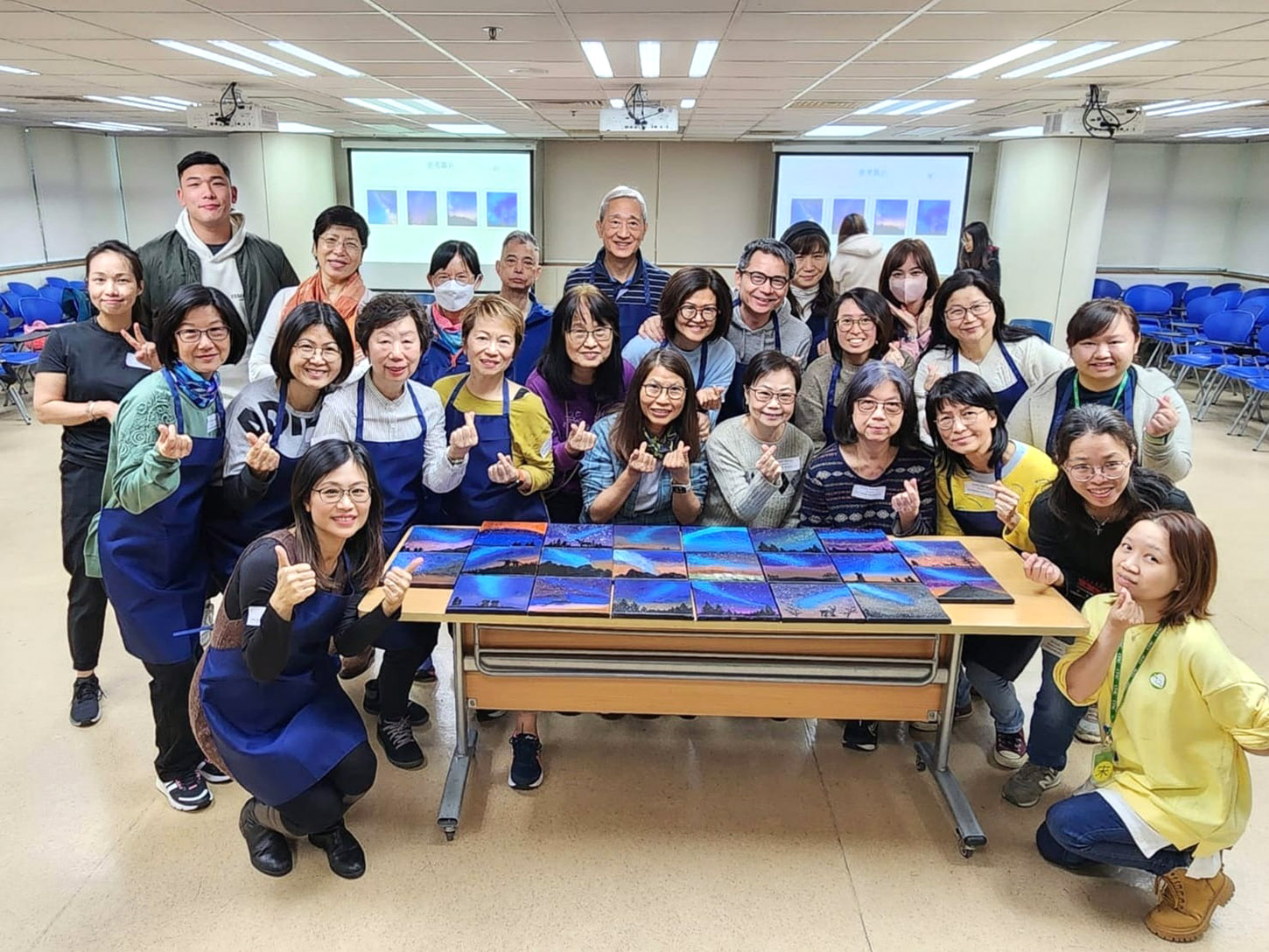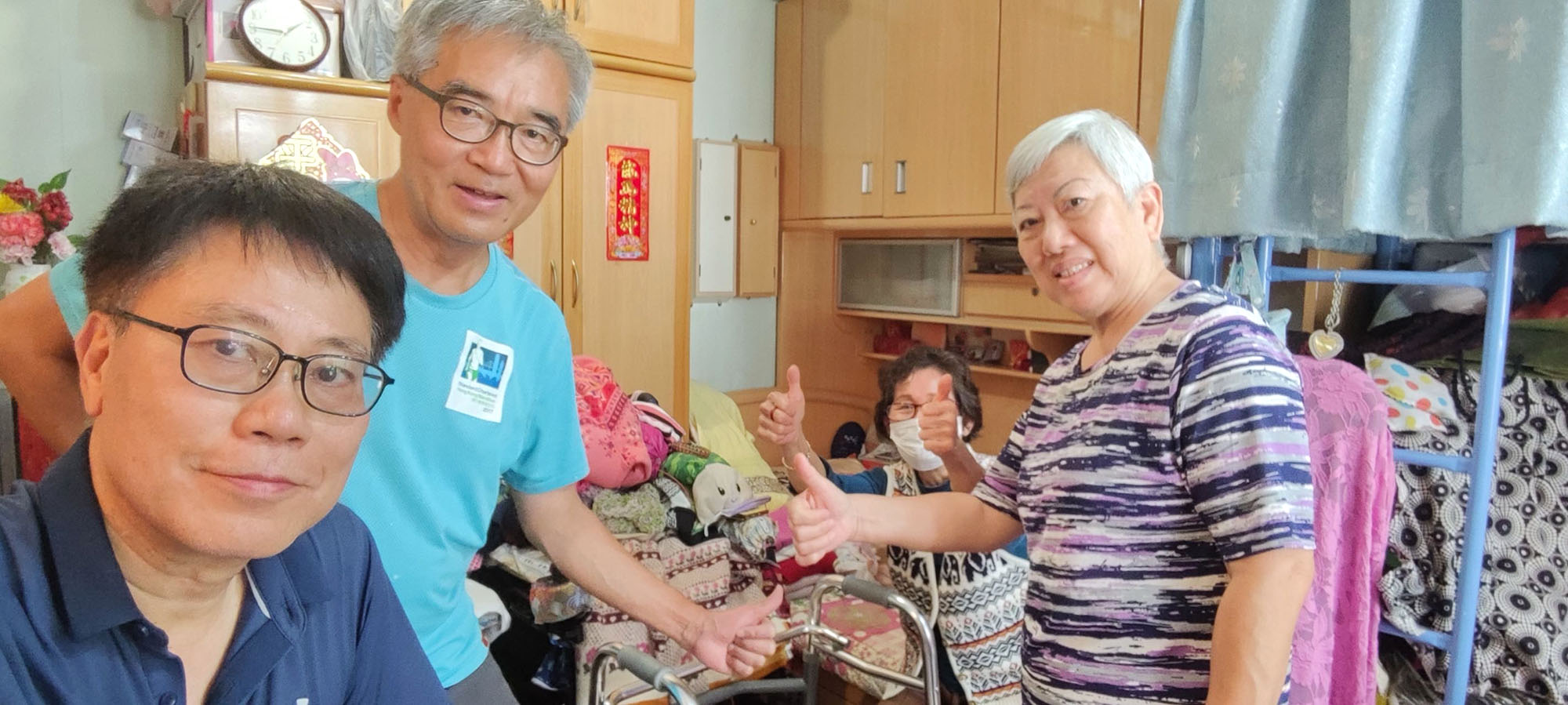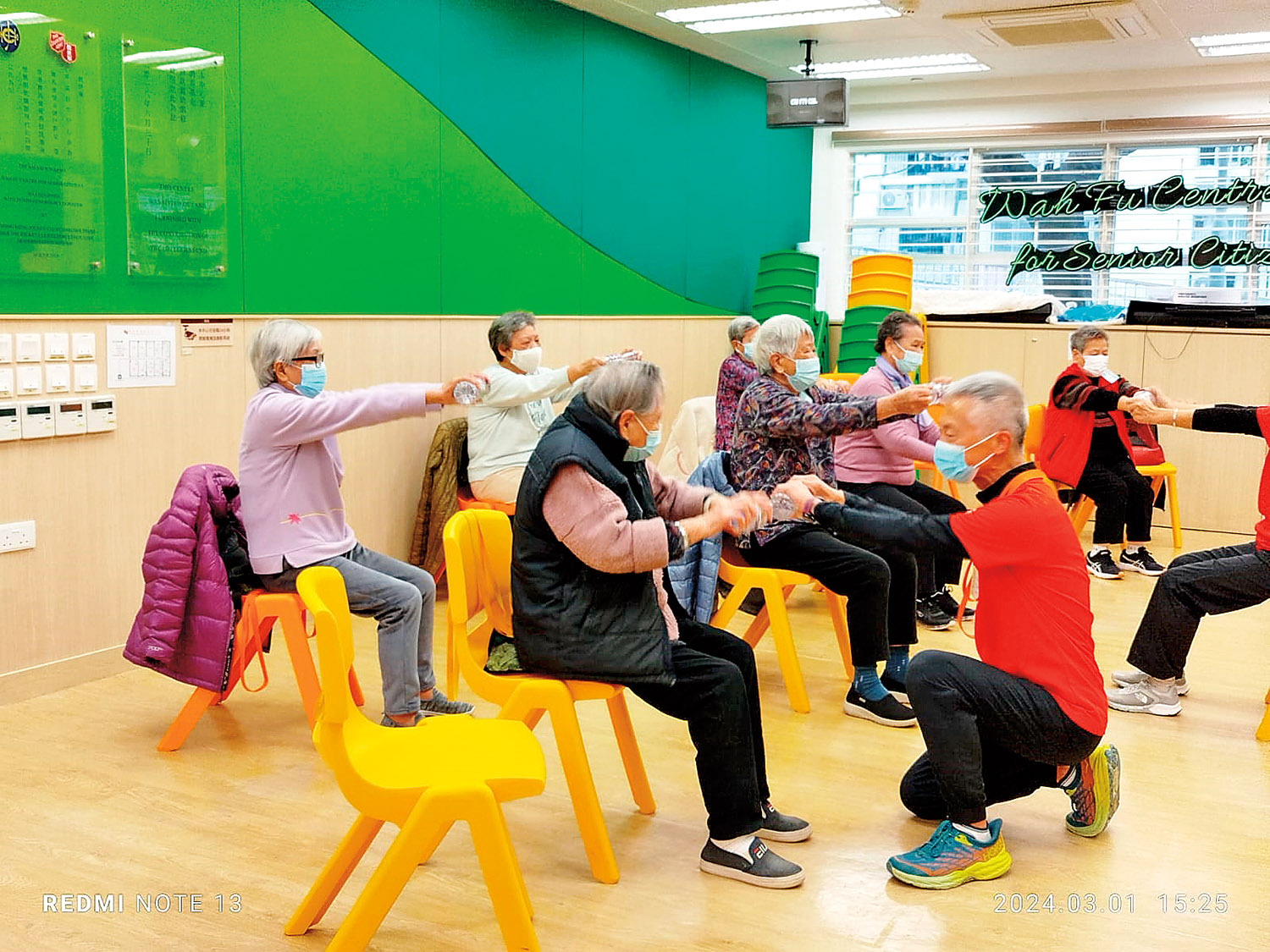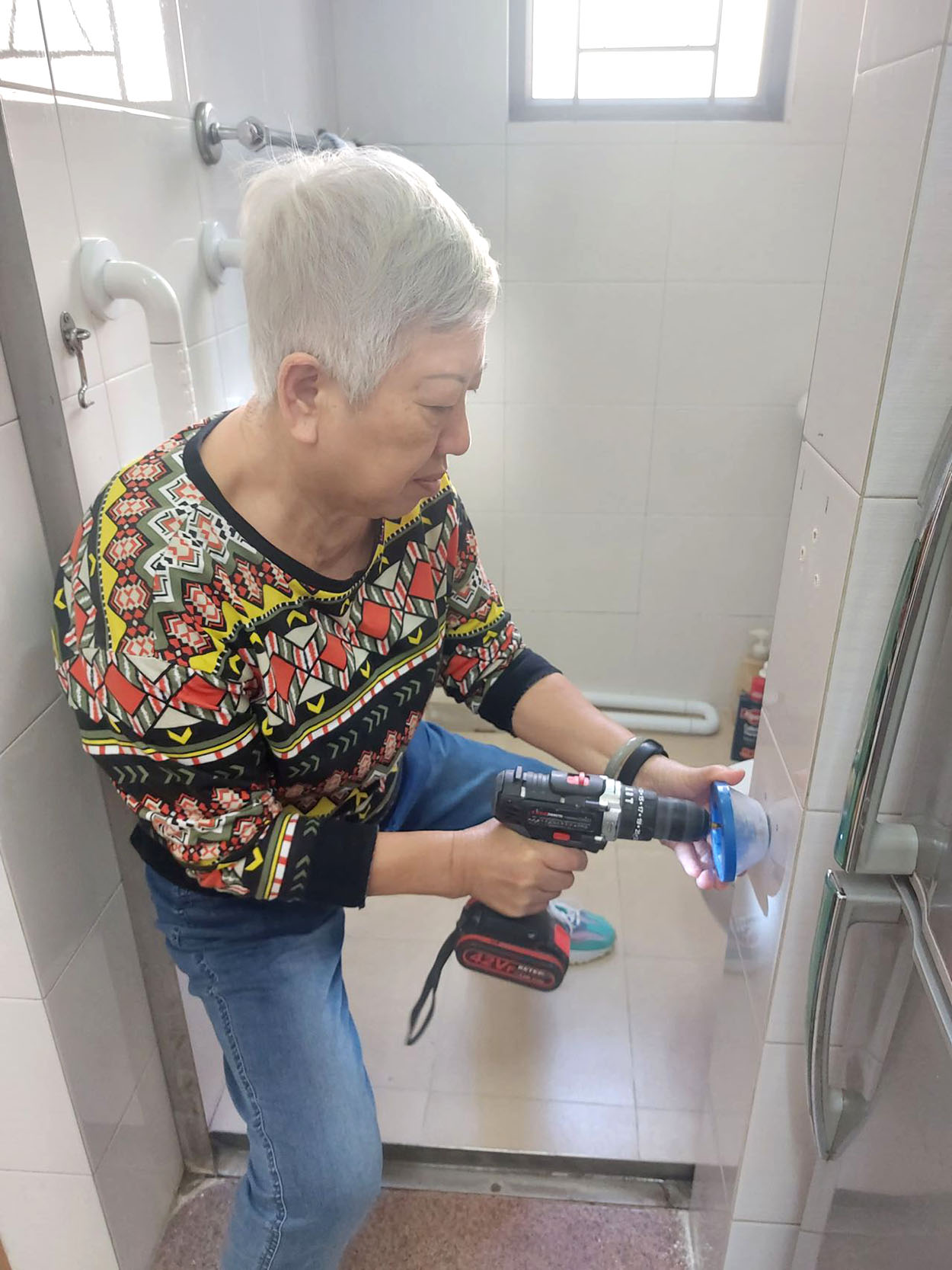City's seniors ramp up volunteer work, look to share job skills

Tina Chan Yuk-ting defies the stereotypes about someone her age, with her gray hair the only visible clue she is 72 years old.
She stands without the slightest hint of a stoop, and speaks and moves in a lively manner.
Pushing a trolley stacked with paint cans, brushes, and a new handrail, she is on her way to do volunteer repair work for elderly residents living in public housing in Hong Kong's Tsuen Wan district.
She was one of the three volunteers assigned to the project by Repairsgivers, an NGO dedicated to assisting the elderly, particularly those living alone, with home repairs.
Chan, a former healthcare assistant at the city's Princess Margaret Hospital, learned to paint walls and install handrails last year, and volunteered for Repairsgivers.
READ MORE: Comfort in sharing
Since retiring in 2003 at the relatively young age of 51, Chan has dedicated herself to two decades of volunteer work. This has included guiding a blind runner on a 5-kilometer run, visiting the elderly and taking them to hospital for treatment and helping them cut their hair.
While there is no official tally of volunteers in Hong Kong, the Agency for Volunteer Service provides a glimpse into the city's robust volunteer culture. As of March 2023, the AVS had 8,352 registered volunteers, with approximately 11 percent, or 925 individuals, over the age of 65.
A study by the Hang Seng University of Hong Kong's Department of Marketing in July, which was commissioned by the AVS, found that 8.9 percent of the city's elderly have participated in volunteer work.
The survey also found that one in every two Hong Kong residents participated in some form of volunteerism.
The study further revealed that volunteers contributed 158 million hours in 2023, marking an 80 percent increase from 15 years earlier, and equating to economic output of HK$1.09 billion ($130 million).

Melissa Kaye Pang, chairwoman of the Hong Kong Agency for Volunteer Service, attributes the city's enduring tradition of volunteerism to the joy it brings participants.
Chan is the epitome of this tradition. She said when she retired she didn't expect to become a "full-time" volunteer, but is busy almost every day helping people across the city. Her phone's step counter indicates she clocks up almost 10,000 steps a day.
She said volunteering keeps her occupied and leaves little time for any self-pity, despite living alone. Instead of idling away her time sitting in parks, Chan said she finds comfort in devoting time to helping other people.
Philip Wai Bo-wah, who recruited Chan as a volunteer, is a co-founder of Repairsgivers.
The NGO has over 100 volunteers on its list who provide repair services to elderly people living alone and those on Comprehensive Social Security Assistance subsidies. Volunteers like Chan are usually involved in two to three repair projects every week.
In 2023, Repairsgivers handled 526 cases, with 453 of them elderly people. This year, their goal is to complete 600 cases, with 80 percent of them households receiving the CSSA government subsidy.
For non-CSSA recipients, a nominal fee of HK$300 is charged to cover transportation and material costs, which is much cheaper than commercial prices for repair works.
Hong Kong Executive Councilor Lam Ching-choi, who also serves on the advisory panel on the silver economy, said the participation rate of Hong Kong's elderly people in volunteer work is not low when compared with other developed regions, but, it has room to grow.
With the population continuing to age, silver volunteers can join volunteer work in a more organized and broader way, allowing their voices to be heard in society, Lam said.
Beyond the traditional roles of volunteers, Lam said many elderly volunteers with professional skills can offer assistance to grassroots people in areas such as financial management and medical advice.

Sharing skills
With an increasing number of well-educated seniors retiring, Lam also suggested greater utilization of retirees' skills in the workforce.
Many of them are financially secure, but may be willing to work for half or a quarter of a full-time salary, in exchange for a meaningful role in an organization's operations.
This way, the organization doesn't need to commit to a costly full-time job to get professional services, he noted.
Such a model has been adopted overseas.
Terry Lum, a professor at the Department of Social Work and Social Administration, University of Hong Kong, said the United States government provides a platform that matches retirees' skills with small organizations that can't afford to hire full-time employees for certain jobs, such as specialized accounting or bookkeeping.
These organizations' need for such services might only arise once or twice, which makes the platform an ideal solution for both retirees and the organizations, he said.
Lum, who is also a member of the Hong Kong Chief Executive's Policy Unit Expert Group, suggested that the Hong Kong Special Administrative Region government, or an organization like the Hong Kong Jockey Club, could take the lead in establishing a similar platform.
Project GrandMove, a program that trains retirees to become exercise instructors for the elderly, is one of the new choices open to volunteers.
Lum, who heads the project, said that apart from the chairman of the board, all the board members are volunteers. Meetings are convened, and board members are fully involved in the decision-making process.
So far, the project has trained about 230 volunteer coaches, with 80 percent of them aged over 60. A total of 1,964 elderly people have participated in the exercise program.
Many of the volunteers are retired civil servants and college teachers. "These retirees are in pursuit of self-improvement through their volunteer work," Lum said.

Lifelong learning
Volunteers in Hong Kong are involved in various projects, but there seems to be no structured pathway for personal development.
"Traditionally, the less-educated elderly, who used to be blue-collar workers, could only take on easy-to-learn volunteer work that required minimal training," Lum said.
The emerging generation of seniors, however, has higher expectations for their involvement in volunteer work.
Another program led by Lum — JC JoyAge: Jockey Club Holistic Support Project for Elderly Mental Wellness — is making changes in this regard. JC JoyAge has trained more than 6,600 elderly volunteer "ambassadors" to promote mental health in the community. A total of 920 have been trained as peer supporters — a role that requires an additional 80 hours of mental health training.
Peer supporters are assigned for nine-month periods to assist elderly people experiencing mental distress, providing one-on-one support through their recovery. The support work involves checking on the elderly person and accompanying them to medical appointments.
"We offer the elderly (volunteers) the opportunity to give it a try and if they like what they are doing, we will provide them different choices to get their skills up to standard, thus making them realize that volunteerism can be a lifelong learning process," Lum said.
After spending a lifetime working in the same job or industry, most individuals enter retirement with a clear idea of what they want to learn and accomplish in their volunteer endeavors, he said.
Lum cited a case of a retired nurse who joined the JC JoyAge program as a peer supporter.
She had spent almost her entire career within the confines of a hospital ward, contending with a monotonous work environment. Her demanding job left her with little time to socialize with peers, or participate in activities outside work.
In her role as a peer supporter, however, she has found happiness and satisfaction. She has had the opportunity to better interact with her peers, and gained insights on how to improve her relationships with family members.
The need for skilled volunteers is compounded by Hong Kong's rapidly aging population.
The HKSAR government's latest projection showed the number of people aged 65 and over will increase to 2.74 million by 2046, accounting for 36 percent of the city's population, and up from 1.45 million, or 20.5 percent, in 2021.
If each senior dedicates half a day per week to volunteer work, the impact could be substantial. "Many people fail to recognize that social engagement is actually more crucial for retirees than for those who are still employed," Lum said.
Hong Kong Executive Councilor Lam said being a volunteer could significantly benefit the mental health of the elderly, especially those who are starting retirement, by reducing loneliness and depression and improving emotional well-being.

Better engagement
In 2014, the HKSAR government tasked the Elderly Commission to come up with a holistic plan for elderly services in the city. The "Elderly Services Programme Plan" was unveiled in 2017 and contains a list of short, and medium- to long-term recommendations.
Empowering the elderly to live to their full potential and promoting an active lifestyle were highlighted as central to elderly services. One suggestion was for the elderly to form a group to initiate, organize and manage their own learning and volunteer programs.
Lam, who headed the commission at the time, said the elderly group could have greater flexibility in identifying the diverse needs in society and make their own plans to address these needs. This would give them a greater sense of satisfaction and involvement, he added.
The plan also proposed the use of a social enterprise model to engage the elderly in working for gainful employment.
Wai, the co-founder of Repairsgivers, is a good example of this. He retired from his job as a sales manager at the age of 54 and started regular participant in volunteerism.
He accompanied the elderly or those with disabilities to medical appointments. He also still teaches Yi Jin Bang — a Chinese qigong exercise that uses a short stick to relieve shoulder and neck pains.
ALSO READ: Survey: Hong Kong residents need HK$1.03m savings to feel secure
In 2018, Wai's volunteerism journey took another turn when a proposal he and seven other retirees made won seed money of HK$60,000 in a Jockey Club entrepreneurship competition for the over-50s.
In September of that year, their idea to set up Co-Creative Partners, a social enterprise to accompany elderly people in need, came to fruition.
The social enterprise morphed into Repairsgivers, and in 2023 it received funding from the Social Innovation and Entrepreneurship Development Fund.
Of the Jockey Club competition winners, Repairsgivers is one of the only two that have survived and continued to grow.
Despite having yet to find sponsors for next year, Wai is already making plans and is hoping to work with the city's elderly centers to provide a service desk to recruit or provide consultations for community volunteers.
Most of the retirees nowadays are young and energetic and can still achieve many things, Wai said.
On a personal level, Wai is content with his busy life in retirement. At the age of 65, he has seen his ideas come to fruition, which he said has given him a greater sense of accomplishment that goes beyond his previous work.


